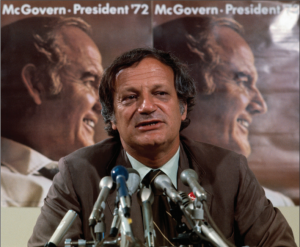by Frank Mankiewicz
I don’t know when or by whom the portrait of my grandfather for whom I was named was created. Frank Mankiewicz was a good American and spoke good English, but his aspect—at least in the portrait— was fierce and pure German. He glowered; the bald head, the firm and slightly turned- down mouth, and the bushy mustache yielded no hint of humor. It was large, well painted, and handsomely framed when I first saw it in the home of my uncle Joe Mankiewicz. He wanted me to have it, either as part of his estate or, better yet, right now. Joe hated that picture, even though his feelings about his father were mixed, at best. I, to be sure, even though I was named for the old guy, wanted no part of it, and the portrait somehow passed through Joe’s estate some years later to my brother, Don, who promptly moved it to his son, John, who soon persuaded my younger son, Ben, to accept it. There, for the moment, in Ben’s living room it hangs, and Ben, with no memory of his great- grandfather, accepts it, I hope, as a work of art.

ill-fated selection of Missouri
Senator Tom Eagleton as
George McGovern’s running
mate in 1972. (Associated Press).
Taken from the book So as I was Saying…
The eponymous Frank Mankiewicz was an immigrant who went from the coal mines of Pennsylvania to a distinguished intellectual career as a professor of German literature. His older son (my father), acclaimed as a wit, New Yorker critic, and playwright, wrote the story and screenplay of what remains the most awarded and acclaimed motion picture of all time; another son, my uncle, won four Academy Awards, two as a writer and two as a director. My brother authored a prizewinning novel, created numerous super- popular television programs, and wrote a screenplay that received an Academy Award nomination. His son now writes and produces television programs, including a much binge-watched hit on Netflix, and my two sons live in Los Angeles and have acclaimed careers, one as senior correspondent for Dateline NBC, a highly rated television network newsmagazine, and the other as the weekend host for Turner Classic Movies, a widely admired, internationally distributed cable channel.
I’ve always thought of that portrait as a pretty good symbol of the family. Nothing permanent, always looking toward the next act. My father, to give the best example, never demonstrated much emotion in our relationship but was always interested in what I was reading, writing, and learning. And yet one of the most emotional moments of my life came when I was aboard a troopship returning from combat in Europe, and our vessel was joined by a tugboat as we sailed into New York Harbor; from my position on the rail of our Liberty ship, I spotted a man with a gray fedora on the deck of the tug looking up at us and waving the hat. It was my father, who’d obtained the arrival time and docking information from pals in the shipping section of The New York Times and had somehow wangled his way on board the tug. Such emotions were always present. My father hated the movies, even though they made him rich at a young age, and passed that hatred on to me, in that I never considered writing for Hollywood; instead, I went to Washington, D.C., which off ers its own form of theater.
Frank Mankiewicz announces Robert F. Kennedy death in June, 1968
For the past twenty- eight years or so, I’ve been blessed with four loving, and loved, daughters (to me they’re daughters, although technically I’m supposed to call them stepdaughters) and nine loving, and loved, grandchildren (six girls, three boys), the gift of my marriage to Patricia O’Brien, except for the latest granddaughter, Josie, the daughter of Ben and his wife, Lee. The daughters— Marianna, Margaret, Maureen, and Monica— and the grandchildren— Charlotte, Brendan, Sean, Sophie, Anna, Erin, Nathaniel, Elizabeth, and Josie— continue to fill our lives with pride and with joy. So, in our family’s next generations, the portrait will undoubtedly have its first female owner. Other welcome changes will occur. But long after we “Franks” are forgotten, the bushy mustache and Germanic gaze will endure, as will whatever “Mankiewicz” has come to mean. My bet: There will be a good story. And lots of laughs.
— Frank Mankiewicz
Washington, D.C.
August 2014
FRANK MANKIEWICZ (1924-2014) was a public relations consultant, lawyer, writer and journalist. He is best known as Robert F. Kennedy’s press secretary but also as the president of NPR, regional director of the Peace Corps, and George McGovern’s campaign director
DR. JOEL L. SWERDLOW is an author, editor, journalist, researcher, and educator. A senior writer and editor at National Geographic for 10 years, his published works include To Heal a Nation: The Story of the Vietnam Veterans Memorial
